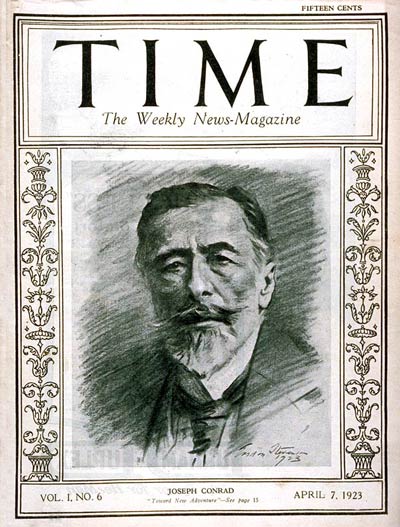
Joseph Conrad wrote some of the most renowned novels of the twentieth century. Born in Poland in 1857, he entered the French marine service in 1874, and in 1878 began to work on English ships, eventually commanding his own ship and traveling to distant and exotic places. He learned English in his teens and became a British citizen in 1886. He began to write novels in the early 1890s, many of them based on his experiences in the East.
In his Personal Record, Conrad wrote that he considered his ability to write English “as natural as any other faculty with which [he] may have been born”, that he never adopted English but was adopted by the genius of the language.1 Eventually he became more British than the British.2
In his novels, Conrad often delves into the portrayal of psychological illness. In The Heart of Darkness, his protagonist Marlow signs up to a trading ship heading for Africa and is first interviewed by a doctor who takes his pulse and then inexplicably uses calipers to measure the dimensions of his skull. Conrad describes the horrors and brutality of the colonial regime in the Congo and focuses on the nervous breakdown and descent into madness of Kurtz, the European trader who becomes increasingly ill and paranoid in the isolation of the African jungle.
In Lord Jim, a central aspect of the story becomes the moral ailment and psychological toll of the chief mate of the Patna, who suffers from persistent guilt and shame for abandoning the sinking ship and its passengers. In Nostromo, Dr. Monygham loses his moral purpose after years of living in the corrupting atmosphere of the fictional port town of Sulaco. The Secret Sharer is a psychologic drama about a newly appointed sea captain who finds his double in an escaped seaman who has committed a murder.
Conrad experienced many illnesses during his life. At nineteen, he developed tuberculosis and required a lengthy stay in the hospital. In 1903, he almost drowned off the coast of Haiti trying to save someone in distress. In 1906, he contracted malaria while sailing on the Congo River and spent several months recuperating in a London hospital. At one time, too, he had hepatitis.
After retiring from the navy, Conrad settled in Kent in England and lived there for the rest of his life. He was never a very healthy man and frequently suffered from indigestion and gout, made less bearable by his hypochondria and tendency towards depression.3 He did not, however, experience a long painful illness at the end of his life. In 1924 he turned down a knighthood offered by George V. In that year he was 66 years old and died almost literally at his desk.3 He remains one of the greatest authors in the English language.
References
- Joseph Conrad. A Personal Record. Malboro Press, 1982.
- Albert Guerard. Introduction to Lord Jim. Dell Publishing Company, 1961.
- Biographical sketch in The Heart of Darkness. Bantam Books, 1969.

Leave a Reply